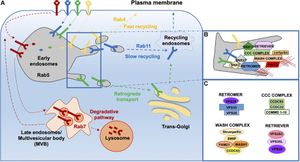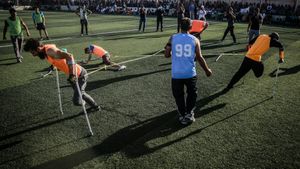The world of sport is once again under scrutiny following the release of WhatsApp messages sent by Albert Luque, the former sporting director of the Spanish Football Federation (RFEF), to Ana Ecube, a close friend of footballer Jenni Hermoso. These messages, which were revealed amid the legal trial concerning Luis Rubiales' controversial kiss to Hermoso, paint a distressing picture of the pressure exerted on Hermoso following the incident.
It was during the post-World Cup celebrations trip to Ibiza, following Spain's triumphant victory, when tensions peaked. Ecube, who accompanied Hermoso during this tumultuous time, testified about the atmosphere surrounding them. According to her, Luque expressed deep frustration with Hermoso's refusal to support Rubiales, who faced considerable backlash for kissing her without consent.
"Me parece tan injusto, tan injusto, lo que le está haciendo a Luis. Me parece de tanta bajeza humana la actitud de Jenni...", Luque wrote. His messages displayed not only his disdain for Hermoso's position but also highlighted his desire for her to align herself with the RFEF's narrative. Luque claimed the situation was fundamentally unfair, attributing Hermoso's behavior to what he saw as malicious intent against Rubiales.
Luque's insistence on Hermoso's involvement became clear as he went on to communicate through Ecube, imploring her to convey his views to Hermoso. He stated, "No tengo problemas de hablar contigo cuando quieras, pero dile a Jenni de mi parte que esto son dos días..."—suggesting to Ecube the ease of persuading Hermoso to acquiesce to their demands. This communication seemed to encapsulate Luque's belief not just of Hermoso's obligation to the federation, but also hinted at personal consequences for failing to do so.
Ecube's testimony revealed the intensity of the situation. She recounted how Hermoso grew increasingly distressed and withdrawn. "Estaba triste y cabizbaja," she described, indicating the emotional toll the circumstances had caused. The pressure was compounded by the insistence of Rubén Rivera, then marketing head of the federation, who relentlessly pursued Hermoso for her response, even to the point of offering to resolve her phone issues just to get her to communicate with Luque.
This insistence from Luque and Rivera left Hermoso feeling overwhelmed. Ecube noted, "Era agotamiento psicológico," emphasizing not only the psychological burden placed upon Hermoso due to the insistence for her cooperation but also the hostile environment they found themselves in. Despite her attempts to enjoy the celebratory trip, Hermoso felt constantly hounded by those expected to support her. Ecube’s recollections reflect the stark reality faced by athletes—especially women—when confronting systemic power dynamics.
Luque's messaging indicates how deeply rooted the issues of consent and agency are within sports environments, especially when influenced by high-stakes politics and negotiations. He channeled his frustration through personal attacks, stating, "Si nos ayudáis ya sabes que Rubiales devuelve muy bien los favores..." This statement served not only as coercion but as manipulation, implying future benefits or retributions depending on Hermoso's actions.
The legal proceedings surrounding Rubiales produced overwhelming public scrutiny for both him and the federation. The controversy ignited broader conversations about women's rights within the sporting industry and paved the way for discussions on the necessary reforms needed to protect women against harassment and coercion.
Given the serious legal ramifications, with Luque facing prison time for his coercive tactics, the fallout continues. His remarks reveal underlying prejudices and systemic issues within the culture of sport. This trial has become emblematic of not just personal wrongdoing but also of the societal narratives around women and their roles within male-dominated spaces.
These messages serve as ominous reminders of the expectations placed upon female athletes to remain silent and compliant. Yet, as this case progresses, it's imperative to recognize the courage demonstrated by Hermoso, Ecube, and many others standing against such injustices.
The resolution of this case may influence how future incidents are approached within the sport, potentially sparking much-needed change. It calls on governing bodies, advocates, and everyday people to engage thoughtfully with these complex and pressing issues, pushing the envelope for women's rights, safety, and dignity both on and off the field.



